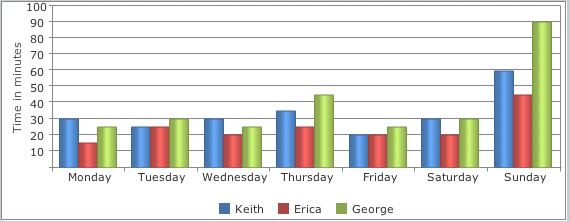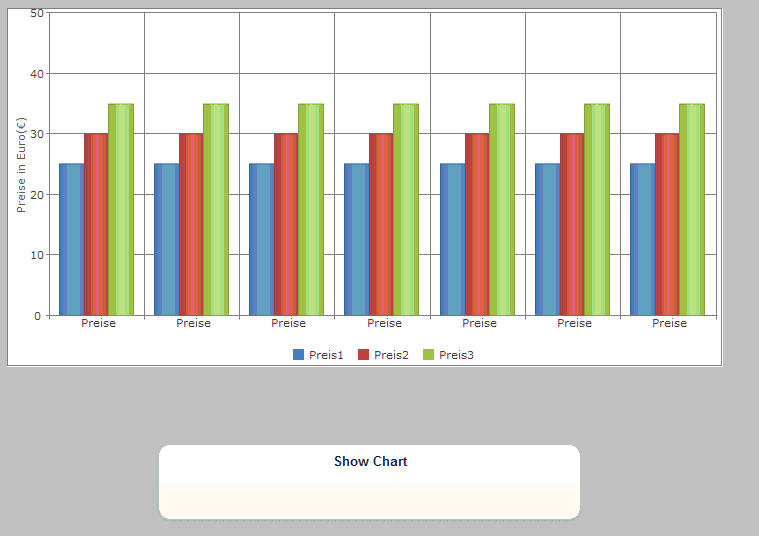JqxChart: Difference between revisions
Jump to navigation
Jump to search
| Line 81: | Line 81: | ||
See above. | See above. | ||
== Example | == Example (BASIC) == | ||
<pre> | <pre> | ||
Dim sampleData, row | Dim sampleData, row | ||
| Line 128: | Line 128: | ||
End Function | End Function | ||
</pre> | </pre> | ||
== Output == | == Output == | ||
[[File:Chart with pur basic.png]] | [[File:Chart with pur basic.png]] | ||
Revision as of 13:11, 3 May 2013
Description
jqxChart is an easy to use chart widget based on the popular jQuery library.
jqxChart supports several common chart types. You can easily plot series of different types on a common chart. A type must be specified for each series group. Currently jqxChart supports the following series types:
- column - simple column series
- stackedcolumn - stacked column series
- stackedcolumn100 - percentage stacked columns
- line - simple streight lines connecting the value points
- stackedline - stacked lines
- stackedline100 - percentage stacked lines
- spline - smooth lines connecting the value points
- stackedspline - smooth stacked lines
- stackedspline100 - percentage stacked smooth lines
- area - area connecting the value points with streight lines
- stackedarea- stacked area with streight lines between the points
- stackedline100 - percentage stacked area
- areaspline - smooth area connecting the value points
- stackedareaspline - smooth stacked areas
- stackedareaspline100 - percentage stacked smooth area
- pie - circular chart divided into sectors, illustrating proportion
- scatter - data is displayed as a collection of points
- bubble - data is displayed as a collection of bubbles
Properties and Methods
See the complete documentation at jqWidget's site: http://www.jqwidgets.com/jquery-widgets-documentation/documentation/jqxcalendar/jquery-calendar-getting-started.htm
Example (JavaScript)
Function Button1_onclick()
'Render the chart.
$("#Chart2").jqxChart(Chart2_settings);
End Function
JavaScript
var sampleData = [
{ Day:'Monday', Keith:30, Erica:15, George: 25},
{ Day:'Tuesday', Keith:25, Erica:25, George: 30},
{ Day:'Wednesday', Keith:30, Erica:20, George: 25},
{ Day:'Thursday', Keith:35, Erica:25, George: 45},
{ Day:'Friday', Keith:20, Erica:20, George: 25},
{ Day:'Saturday', Keith:30, Erica:20, George: 30},
{ Day:'Sunday', Keith:60, Erica:45, George: 90}
];
Chart2_settings.source = sampleData;
Chart2_settings.categoryAxis = {
dataField: 'Day',
showGridLines: false};
Chart2_settings.seriesGroups =
[
{
type: 'column',
columnsGapPercent: 30,
seriesGapPercent: 0,
valueAxis:
{
minValue: 0,
maxValue: 100,
unitInterval: 10,
description: 'Time in minutes'
},
series: [
{ dataField: 'Keith', displayText: 'Keith'},
{ dataField: 'Erica', displayText: 'Erica'},
{ dataField: 'George', displayText: 'George'}
]
}
]
End JavaScript
Output
See above.
Example (BASIC)
Dim sampleData, row
Function Button1_onclick()
'Render the chart.
$("#Chart1").jqxChart(Chart1_settings)
End Function
Function Form1_onshow()
sampleData = []
For i=0 To 6
row=[]
row["id"] = "Preise"
row["Preis1"] = 25
row["Preis2"] = 30
row["Preis3"] = 35
sampleData[i]= row
Next
Chart1_settings.source = sampleData
Chart1_settings.categoryAxis={dataField:"id", showGridLines:True}
Chart1_settings.seriesGroups = [ _
{ _
type: "column", _
columnsGapPercent: 30, _
seriesGapPercent: 0, _
valueAxis: _
{ _
minValue: 0, _
maxValue: 50, _
unitInterval: 10, _
description: "Preise in Euro(€)" _
}, _
series:[ _
{ dataField: "Preis1", displayText: "Preis1"}, _
{ dataField: "Preis2", displayText: "Preis2"}, _
{ dataField: "Preis3", displayText: "Preis3"} _
] _
} _
]
End Function

